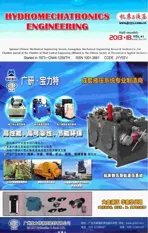Remote Condition-based Maintenance Approach to Hydraulic System of Construction Machinery
2013-06-02ZHAOXiuxuHUZheminJIANGJihaiZHANGQingrun
ZHAO Xiuxu ,HU Zhemin,JIANG Jihai,ZHANG Qingrun
1.School of Mechtronics Engineering,Wuhan University of Technology,Wuhan 430070,China;2.Harbin Institute of Technology,School of Mechanical and Electrical Engineering,Harbin 150001,China
1.Introduction
Hydraulic system has advantages of high power,small volume,high accuracy,so it is widely applied in hgh-power and automated construction machinery[1].While its structure becomes more and more complicated,there are more and more difficulties to control the working process because of its closed structure.It is also the reason why fault diagnosis of hydraulic system has been widely concerned by researchers in recent years.
Generally,knowledge-based method fully utilizes both experts’knowledge and diagnostic strategy,provides intelligent data analysis ability for diagnosis and maintenance,avoids the error in application with modeling and issue on how to select the right instrument and method of signal analysis,and develops rapidly[6].It can locate and clear faults fast,espe-cially in a complex and nonlinear system.Typically,the knowledge integration is a key issue.A complex base of experience knowledge and analytical knowledge will improve the accuracy and reliability of diagnosis.
As an actuator,the status of hydraulic cylinder affects the system performances,the common faults of hydraulic cylinder are leakage and creeping which lead the lost of thrust or velocity and unsteady working[7].It will have serious influence on the performance of system,causing it is important to diagnosis it timely and accurately.Liu applied Bayesian networks to build a cylinder creeping model to detect causes[8].Goharrizi established a wavelet transform-based approach and empirical mode decomposition and Hilbert spectrum to detect internal leakage in hydraulic actuators[9-10].
From the cost perspective,condition-based maintenance(CBM)is a maintenance program that recommends maintenance actions based on the infor mation collected through condition monitoring.It attempts to avoid unnecessary maintenance tasks by taking maintenance actions only when there is evidence of abnormal behaviours of a physical asset.A CBM program,if properly established and effectively implemented,can significantly reduce maintenance cost by reducing the number of unnecessary scheduled preventive maintenance operations[11].In this study,a remote condition-based maintenance approach for hydraulic system in construction machinery is presented,an application system has been developed.In the following sections,the system structure,and the key problems in this approach are discussed,a case study is presented in section 4.Finally,we conclude the paper by reiterating our main contributions.
2.Integration of fault knowledge based on extended FMEA
Practically,different equipments need to make different maintenance decision under different situations.For industrial application,cost consideration always plays the major role,while it is reliability for military equipment[12].That is,the troubleshooting decision should be a deliberated tradeoff with system structure,efficiency,and cost.
FMEA is usually used as design FMEA,procedure FMEA and equipment FMEA,performing in the production life cycle.The main objective of FMEA is to discover and prioritize the potential failure modes(by computing respective RPN),which pose a detrimental effect on the system and its performance.A reliability centered maintenance methodology based on FMEA is developed for improvement[13].An integration model of FMEA and QFD(Quality Function Deployment)is presented in literature[14].These methods are connected by feedback relation in each cycle to improve product quality.
FMEA provides the ability to identify potential faults,evaluate severity,occurrence and detection of the fault,determine the effects,and propose solving measures,a corresponding knowledge base can store useful information and support the decision making process[15].But traditional FMEA is lack of log fault symptom and monitoring information,cannot meet the need in this study.To solve the problem,we propose extended FMEA to integrate expert knowledge and working data for condition-based maintenance.As shown in Tab.1,some typical failures such as sealing and leakage etc.are listed.And also,Sensor Installation describes the type and site of sensors,and Detection Parameters is a record of sections of features to achieve threshold judgment.There still need some field to explain the relation between sensor and feature analyzed in Section 4.3 and 4.4 while are not given in the table.
Expert knowledge is the core of database,but it’s ambiguous.During the analysis,we calculated the values of severity,occurrence,detection and RPN by fuzzy comprehensive evaluation method,ensuring suitable safety assessment[16].
3.System design and Key problems discussion
3.1.System structure
As shown in Fig.1,the architecture of system consists of 3 layers,namely data layer,technology layer and application layer.
1928年,英国经济学家凯恩斯曾预测,100年后,欧美生活水平将会很高,人们也将会很休闲,至少不必再疲于奔命地去挣钱了。凯恩斯这个预测只得到部分证明。今天的欧洲人的确比较休闲,但美国人年平均工作时间仍比法国人多300小时。(2018.9.26《报刊文摘》)事实上,很多现代人不仅不比前人轻松,还更忙了。
Data layer is mainly responsible for data acquisition.In most practical cases,inaccurate fault analysis may be caused by the information come from only one type of sensor;sometimes it is unilateral and fuzzy.So it is necessary to collect the related data with multi-sensor.In this system,it contains pressure sensors,displacement sensors,wireless data acquisition card and the front end software.Data acqui-sition card with corresponding program collects the displacement and pressure sensors readings of hydraulic cylinder through Wi-Fi,making diagnosing decision under multi-task mode.With LabVIEW platform,seamless connection between card and software can be realized.Wavelet packet method is adopted to process the non-stationary signals for the fault features extracting of hydraulic system.
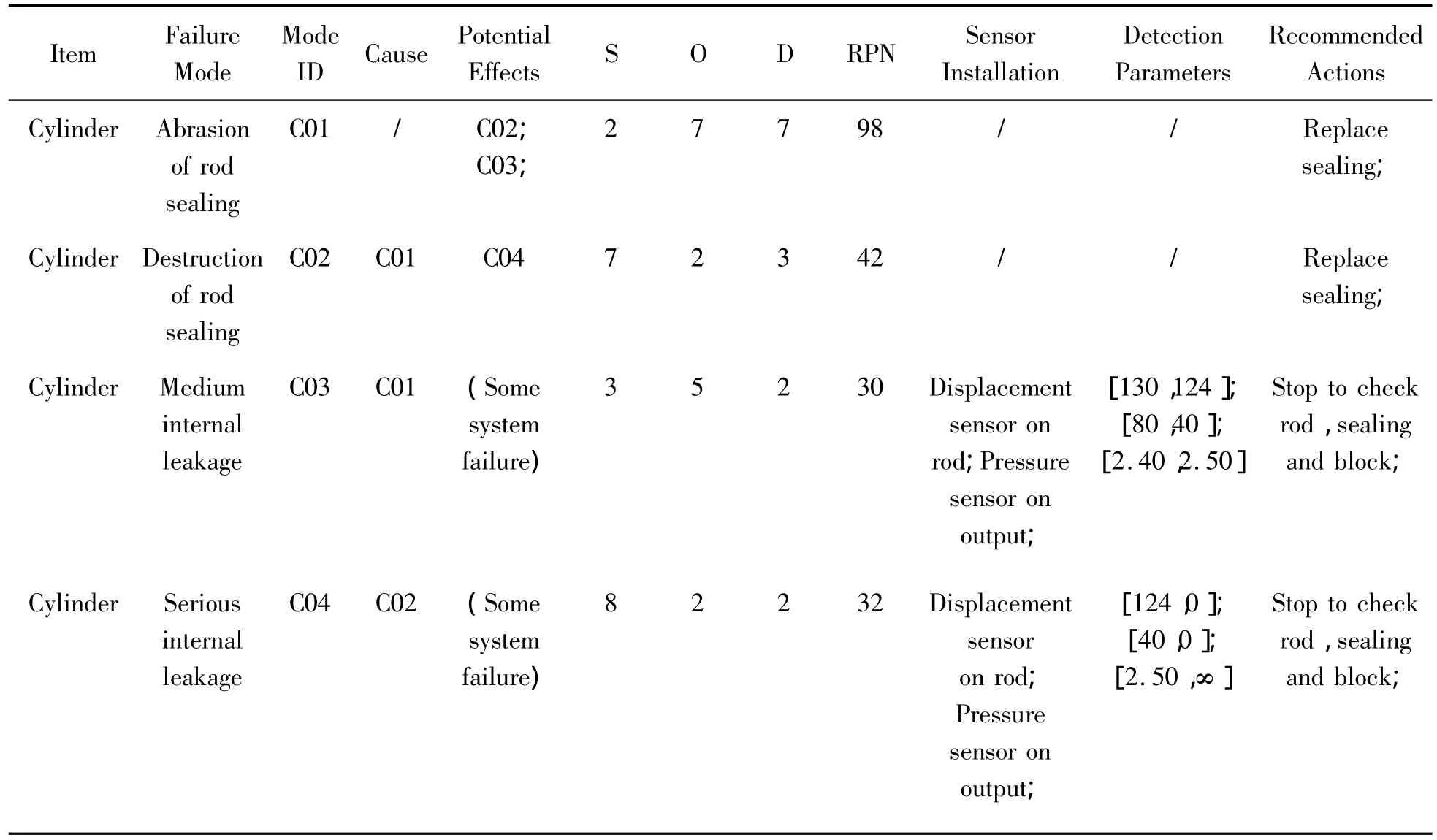
Tab.1 Examples of extended FMEA knowledge
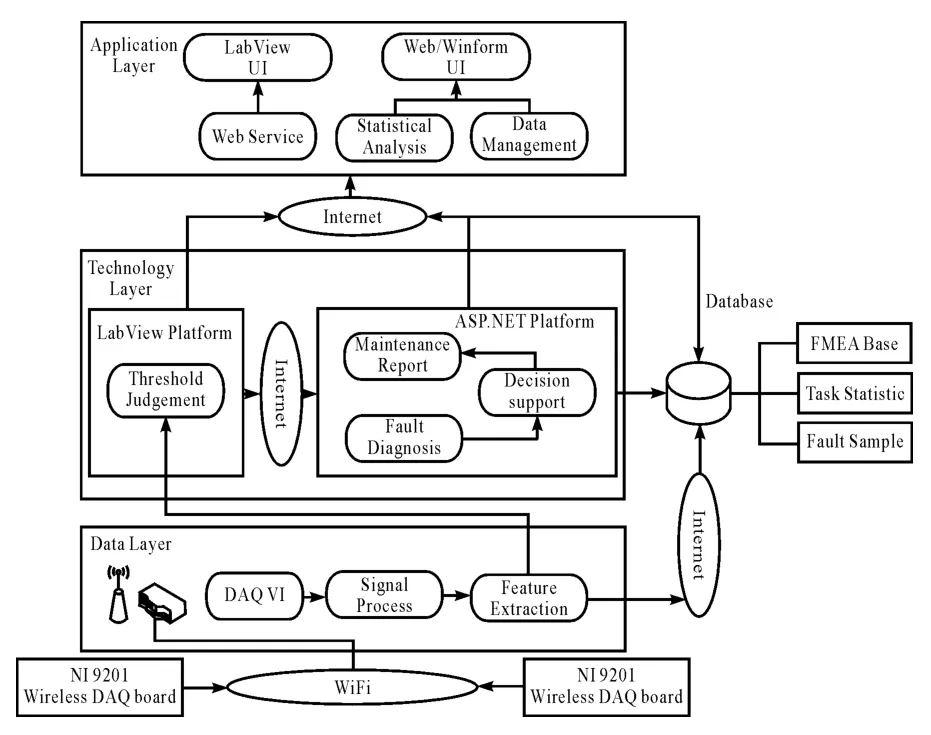
Fig.1 Framework of System
Technology layer is the core of system,including the engine of fault analysis and inference machine.A threshold judgment is run in front end software firstly to detect fault and get its fault features.Then the fault features will be transferred to back end service to identify the fault level and stored in database.Treating,maintaining and preventing measures are generated by FMEA knowledge base and sent to the front end software.
Application layer provide the interactions between front end or back end users.For front end users,the result of diagnosis is send back to software.For back end users,the statistical data or charts which are important for product designing and upgrading can be obtained and summarized.
3.2.Information integration
Although all modules are achieved in the same Web server of technology layer in this system,the data exchange is relatively simple,by file streams or SQL server.Considering of the trend of CBM(condition based maintenance)system and application of distribute system,we still treat information integration as a key issue,attempting to satisfy the structure and standardization of MIMOSA OSA-EAI and ISO.
Fig.2 shows the information flows among the modules.The critical functions are processed in Webservice layer.Because of data volume,these functions may be processed in independent server,while the functions are repalceable and composable,demanding unify and logical interfaces should be made amaong them.In our study,the father function request child function by SOAP/HTTP request,and the child return XML file as a format result to father.The data will be stored in database in the same time.All the function are called by public interfaces,Webservice API and Winform API programed by ASP.NET,in Fig.2.When user run a public interface,such as mainteneance report Interface,it will actually trigger the mainteneance report function.Firstly,the function searches database,if the data and information is absent,the child function,desicion support function will be run.
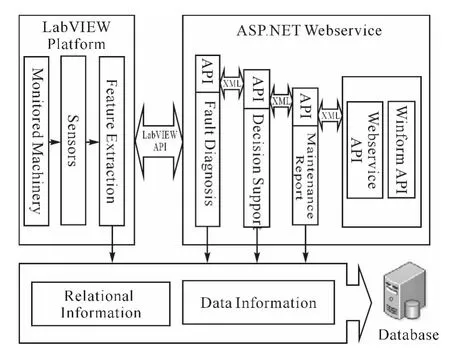
Fig.2 Information Integration Model
3.3.Remote data acquisition
Considering the practical working condition of construction machinery,the reliability and accuracy of hydraulic system may be influenced by contaminative oil.In this study,wireless data acquisition is used to collect data of system status,and remote maintenance support is developed to shorten the diagnosis time and improve the precision of fault identification for user,and provide samples for system designer to optimize their product,saving wiring cost,achieving distributed measuring,and providing a fully system description.
In the working site,the wireless data acquisition cards are set up for each machine,to transfer realtime data to front end software by Wi-Fi and achieve multi-machine-monitoring.A multiple sensors approach has been adopted to collect data.Thereinto,displacement sensors collect the position signal of the hydraulic cylinder piston rod,pressure sensors collect the pressure signal of the outlet of the hydraulic cylinder.The sensors are connected to wireless DAQ board.With the software developed based on Lab-VIEW,seamless connection with hardware can be easily achieved and some signal process methods are invoked directly.
Remote diagnosis technology based on Internet is a combination of Internet communication and fault diagnosis technology.The opological structure of system is shown in Fig.3,the system contains web users and winform users which we treat as back end operators belonging to suppliers,and at the same time,machine users is front end operators.These two type operators have different issues on data,that is,front end operator focuses on data acquisition and feature extraction,and back end operator focuses on fault diagnosis and statistics.
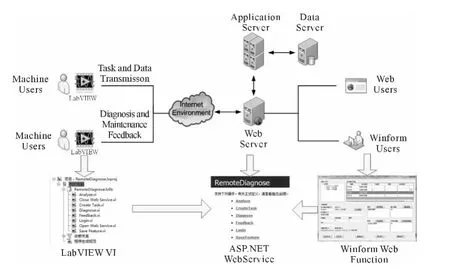
Fig.3 Remote Fault Diagnosis
According to above description,the back end operator is designed as clients and browsers in C/B/S structure.If they are authorized,web server can receive the fault features of acquisition task sent from front end,after diagnosing and reasoning process,and then push the result back to front end and store in database.Users,containing Web ones and Winform ones,can summarize the statistical data or chart and manage the system and database respectively.
3.4.Fault Features extraction
Usually,the signals of hydraulic system in construction machinery are non-stationary and noisy.Wavelet analysis is a time-frequency analysis method which can be applied to handle these signals effectively.It can focus on details of the signal with automatically adaptation to the requirements of time-frequency signal.In the previous study,we are mainly focus on hydraulic cylinder and found leakage affect the stability in all frequency bands,and some fault features can be used to indicate the leakage level[17].A hydraulic cylinder leakage test-bed have been designed,and the faults are identified by the connections between leakage and features[18].
As shown in Fig.4,fault features can be analyzed with the data collected on it.The active and fitting curves indicates the connections between leakage level and fault features,which are useful for fault diagnosis and prognosticaton.
Using WA WP Decomposition VI in LabVIEW,signals can be processed,and the fault features are extracted.Then,Displacement Analysis VI and Pressure Analysis VI can be established according to above procedures.

Fig.4 Fault Diagnosis by Wavelet Packet
3.5.FMEA knowledge base
In this study,a FMEA knowledge base is established in SQL Server database to support the fault diagnose and system maintenance.
Generally,faults are detected as system fault or part fault in hierarchy structure mechanical-electrical equipment[20].Thus,they can be divided to describe structure and failure separately and then connected by a relation table.The system is analyzed by hardware method to establish production structure model and failure model.In the structure model,it not only expresses the mix and function,but also indicates the fault transmission implicitly by iterative relations.The iterative relation should be contained together with information of single fault.Appling two model,description and relation of faults are represented completely and accurately.
As pre-mentioned,there are interactions in different failure modes,for example,part failure mode can lead system failure mode or other part failure mode.This coupling relation should be analyzed and stored in FMEA base,the relation is shown in Fig.5.The relation contains indirect transmission which accords to the production structure,and direct transmission which express by FMEA records.
4.Case study
According to aforementioned structure and method,a remote diagnose and maintenance system for hydraulic cylinder is developed.The back end system achieved the functions of diagnose and maintenance based on ASP.NET,connecting to the front end software easily and safely.As shown in Fig.10,the front end software is developed on LabVIEW,realizing real-time data acquiring,primary diagnose with threshold and interface to the back.
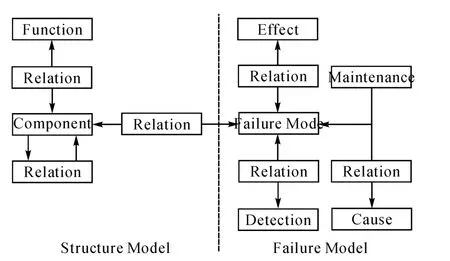
Fig.5 Structure Model and Failure Model
The system has been run on our test-bed to collect analytical data and test reliability.In application,the DAQ board is NI 9201,which is 8-channel analog input at a maximum aggregate rate of 500 kS/s,the data is sent via Wi-Fi;A QH-400 grating sensor is setted to measure the position of plunger,and a AK-4a pressure sensor is setted to measure the pressure of rod end;Maximum travel of cylinder is 300 mm,input pressure of system is up to 7 MPa.We focus on internal leakage fault for its difficulty on observing,especially minor and mediem leakage.
If user want to connect with server,a task should be created with an auto-generated number,then choose or add the details testing parameters,such as machine type,cylinder type and oil type,and then receive the corresponding threshold if the conditions are matching.
After monitoring data and calculating features,the software would send judgment request with task information including ID,parameters and features to Web service which is running in the industry,to call diagnosis and maintenance service.The service recognizes the fault by BPN and corresponding sample selected by testing parameters and analyzes the decision and maintenance measurements for the fault,while the task information will be stored in database,and some knowledge will be updated such as occurrence in FMEA base.After the called service running out,the result will be pushed to front end software and show to users.
5.Conclusions
Due to the complicated structure of hydraulic system,there are many difficulties on its fault diagnosis in the working site.In this study,a remote condition-based maintenance approach is presented,an application system with FMEA knowledge base has been developed for construction machinery hydraulic system.The front end of this system is based on Lab-VIEW and aims to collect the operation data of cylinder with multi-sensor and extract fault features in the work site;the backend is based on ASP.NET and can provide service to identify the fault diagnosis and make maintenance decision with the information from front end via Internet;a FMEA knowledge base is established to support above procedures.With the connection among diagnosing center, suppliers, and construction machine users,economic benefits can be obtained by reducing the troubleshooting time and cost of maintenance.
[1]Wang C J.China Hydraulic Pneumatic Industry the Current Situation and Countermeasures 2011 Hydraulic Pneumatic Sealing Industry Working Conference Report.Hydraulics Pneumatics& Seals,2012,1:4-8.
[2]Venkatasubramanian V,Rengaswamy R,Kavuri S N,et al.A review of process fault detection and diagnosis Part I:Quantitative model-based methods.Computers&Chemical Engineering,2003,27:293-311.
[3]Azadeh A,Ebrahimipour V,Bavar P.A fuzzy inference system for pump failure diagnosis to improve maintenance process:The case of a petrochemical industry,Expert Systems with Applications,2010,37:627-639.
[4]Dong M,He David.A segmental hidden semi-Markov model(HSMM)-based diagnosticsand prognostics framework and methodology.Mechanical Systems and Signal Processing,2007,21:2248-2266.
[5]Jiang W L.,Wu S Q,Liu S Y.Exponentially Weighted Dynamic Kernel Principal Component Analysis Algorithm and Its Application in Fault Diagnosis.Journal of Mechanical Engineering,2011,47(3):63-68.
[6]Angeli C.Online expert systems for fault diagnosis in technical processes.Expert Systems,2008,25:115-132.
[7]Zhan C C.Reliability and Diagnostics on Hydraulic System.Beijing:Metallurgical Industry Press,2009.
[8]Liu X L,Chen G M,Li F X,Zhang Q,Miao C C.Fault Bayesian Networks and Its Application to Hydraulic Cylinder Creeping.Chinese Hydraulics & Pneumatics,2012(8):108-111.
[9]Goharrizi A Y,Sepehri N.A Wavelet-Based Approach to Internal Seal Damage Diagnosis in Hydraulic Actuators.IEEE Transactions on Industrial Electronics,2010,57:1755-1763.
[10]Goharrizi A Y,Sepehri N.Internal leakage detection in hydraulic actuators using empirical mode decomposition and Hilbert spectrum.IEEE Transactions on Instrumentation and Measurement,2012,61(2):368-378.
[11]Andrew K S Jardine,Daming Lin,Dragan Banjevic.A review on machinery diagnostics and prognostics implementing condition-based maintenance.Mechanical Systems and Signal Processing,2006,20:1483-1510.
[12]Xia L H,Jia X S,Xu Y.Reasonable Choice and Decision-making Flow of Equipment Maintenance Policy,JOURNAL OF GUN LAUNCH & CONTROL,2006,(4):63-68.
[13]Azadeh A,Ebrahimipour V,Bavar P.A Pump FMEA Approach to Improve Reliability Centered Maintenance Procedure:The Case of Centrifugal Pumps in Onshore Industry.Proceedings of the 6th WSEAS International Conference on FLUID MECHANICS, FLUIDS’09,2009.
[14]He Z,Zhao Y,Zou F.Study and Application of the Integration of QFD and FMEA in Product Design Phase.Modular Machine Tool&Automatic Manufacturing Technique,2007(4):97-100.
[15]Zhao X X,Bai X L.The application of FMEA method in the risk management of medical device during the lifecycle.2nd International Conference on e-Business and Information System Security,2010.
[16]Cui W B,Wu G T,Sun P T,Zhang Y Q.Ship safety assessment based on FMEA and fuzzy comprehensive evaluation methods.Journal of Harbin Engineering University,2007,28(3):263-267,276.
[17]Li R,Research on Method of Engineering Machinery Hydraulic Cylinder’s Fault Feature Extraction Based on Wavelet Analysis,Wuhan:Wuhan University of Technology,2012.
[18]Li Y,Wang L,Jiang J H.Experimental Research on Internal and External Leakage of Construction Machinerv Hydraulic Cylinder.Machine Tool& Hydraulics,2012,40(12):5-9.
[19]Wang L H,Guo J J,Wu B,Yang S Z.Correlative Dimension Analysis on Dynamic Properties of Moving Hydraulic Cylinder.Machine Tool & Hydraulics,2006,(9):99-102,2006.
[20]Zheng X J,Yang S Z,Shi H M,Zhou A F.The Hierarchy Diagnostic Model for Diagnostic Expert Systems.Journal of Huazhong University of Science and Technology,1987,15(2):9-14.
猜你喜欢
杂志排行
机床与液压的其它文章
- Selection of Working Parameter for Bladder-type Accumulators with Different Conditions
- Development of Vibration Signal Acquisition and Analysis System for Machine Tools Based on LabVIEW
- Strength Analysis and Optimization of a Torsion Beam Rear Suspension
- Analysis of the Optimization of Gear Pump Pulsation Based on Matlab
- Simulation Evaluation and Performance Analysis of a Double Coil Magnetorheological Valve
- The Conception and Kinematic Simulation of a Cam Mechanism Continuously Variable Transmission
